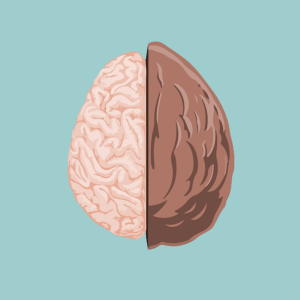
5.1M
Downloads
247
Episodes
I’m Emma McAdam, a Licensed Marriage and Family Therapist and my mission is to make mental health resources more easy to access. I take therapy skills and psychological research and condense them down into bite-sized nuggets of help. I’m here to spread the message that while mental illness is real, it’s common, it’s debilitating, it’s also treatable. There are dozens of research-backed approaches to treating depression, anxiety, and other mental illness. Change, growth, and healing are possible. Please keep courage! Try one little thing every day to improve your life and health and things can get so much better! Therapy in a Nutshell, and the information provided by Emma McAdam, is solely intended for informational and entertainment purposes and is not a substitute for advice, diagnosis, or treatment regarding medical or mental health conditions. Although Emma McAdam is a licensed marriage and family therapist, the views expressed on this site or any related content should not be taken for medical or psychiatric advice. Always consult your physician before making any decisions related to your physical or mental health. Therapy in a Nutshell and it’s logo are Registered Trademarks of Therapy in a Nutshell, LLC
Episodes

Thursday Sep 15, 2022
Postpartum Anxiety and OCD Coping Skills
Thursday Sep 15, 2022
Thursday Sep 15, 2022
Check out my Coping Skills and Self Care course: https://courses.therapyinanutshell.com/coping-skills-and-self-care-for-mental-health
Learn more in one of my in-depth mental health courses: https://courses.therapyinanutshell.com/store
The number one most common complication after giving birth is postpartum anxiety- but almost no one is talking about it. It’s more common than infection, hemorrhage, or postpartum depression, but no one mentions it. But postpartum anxiety is super duper common. About 1 in 5 women experience heightened anxiety to the point of distress post partum. And it can make a new mom feel like her world is falling apart. But PPA is not your fault and it is treatable, so let’s talk about it and what we can do about it. One study showed that at least 18% of women experienced postpartum anxiety, it's probably much higher because it's underreported. And of the women with anxiety, 35% of them had postpartum depression as well. So let’s help people learn the signs of Postpartum Anxiety so they know to get the support they need. Signs and Symptoms Constant worry or dread- Worry about the baby’s safety, health and development Feeling on edge, like something is about to go wrong Excessive worry about your ability to handle being a parent. Irritability Sleep disruption- you can’t sleep because you’re worried (not just because that little munchkin wants a snack every 45 minutes) Racing thoughts Intrusive thoughts-like that you might harm a baby Physical symptoms like: feeling shaky, trembly, jittery, stomach aches, headaches, sweating, short breathing, etc. It usually occurs within the first couple weeks after birth, but can be triggered much later, even when you wean the baby. Some women experience symptoms of panic attacks or OCD Over 50 percent of new parents have recurrent intrusive thoughts of them harming the baby, like “What if I drop the baby?” so this is pretty normal, but for some people this leads to Postpartum OCD when obsessive thoughts become compulsive and overpowering. Compulsions are actions that are repeated to stop the anxiety and include frequent checking, cleaning or ordering things.
Looking for affordable online counseling? My sponsor, BetterHelp, connects you to a licensed professional from the comfort of your own home. Try it now for 10% off your first month: https://betterhelp.com/therapyinanutshell
Support my mission on Patreon: https://www.patreon.com/therapyinanutshell
Sign up for my newsletter: https://www.therapyinanutshell.com?utm_medium=YTDescription&utm_source=YouTube
Check out my favorite self-help books: https://kit.co/TherapyinaNutshell/best-self-help-books
Therapy in a Nutshell and the information provided by Emma McAdam are solely intended for informational and entertainment purposes and are not a substitute for advice, diagnosis, or treatment regarding medical or mental health conditions. Although Emma McAdam is a licensed marriage and family therapist, the views expressed on this site or any related content should not be taken for medical or psychiatric advice. Always consult your physician before making any decisions related to your physical or mental health. In therapy I use a combination of Acceptance and Commitment Therapy, Systems Theory, positive psychology, and a bio-psycho-social approach to treating mental illness and other challenges we all face in life. The ideas from my videos are frequently adapted from multiple sources. Many of them come from Acceptance and Commitment Therapy, especially the work of Steven Hayes, Jason Luoma, and Russ Harris. The sections on stress and the mind-body connection derive from the work of Stephen Porges (the Polyvagal theory), Peter Levine (Somatic Experiencing) Francine Shapiro (EMDR), and Bessel Van Der Kolk. I also rely heavily on the work of the Arbinger institute for my overall understanding of our ability to choose our life's direction.
And deeper than all of that, the Gospel of Jesus Christ orients my personal worldview and sense of security, peace, hope, and love https://www.churchofjesuschrist.org/comeuntochrist/believe
If you are in crisis, please contact the National Suicide Prevention Hotline at https://suicidepreventionlifeline.org/ or 1-800-273-TALK (8255) or your local emergency services.
Copyright Therapy in a Nutshell, LLC

No comments yet. Be the first to say something!